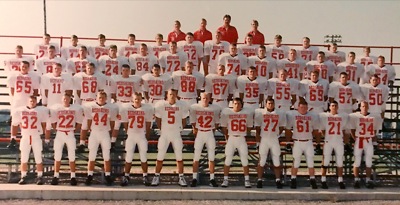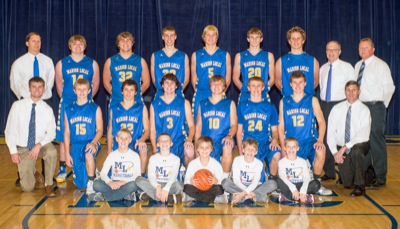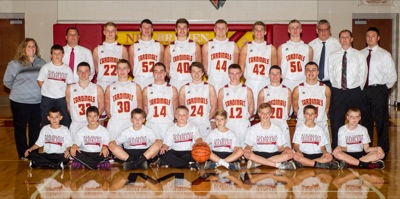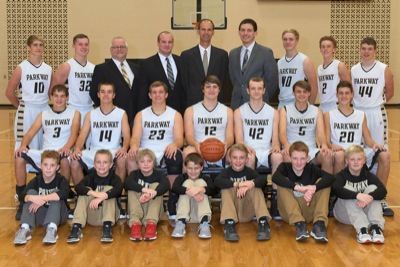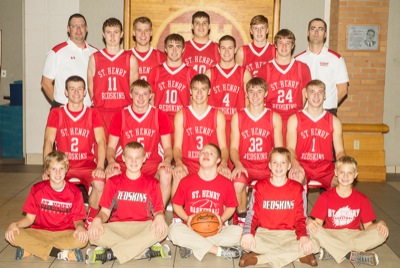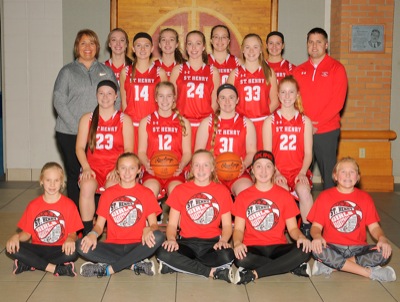Friday, November 24th, 2017
Teachers, recruiters alert students to jobs
By Sydney Albert
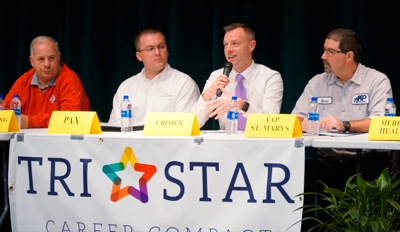
Photo by Sydney Albert/The Daily Standard
Donald Holtvoigt of JR Manufacturing, Jeff Pax of Pax Machine Works, Curt Cramer of Crown Equipment and Dave Voisard of AAP St. Marys speak Wednesday at a business forum hosted by Tri Star Career Compact.
CELINA - Local job recruiters are working with teachers to educate students about local job opportunities and ending misconceptions that the only careers available are at factories and on farms.
Representatives from 11 local businesses met on Wednesday with area teachers to discuss their employment needs. Jared Ebbing, Mercer County economic development director, and Don Berry, a career-based intervention instructor for Tri Star, led the group with questions. Participating companies included Nidec Minster, Ferguson, Duesway, Celina Tent, JR Manufacturing, PAX, Crown Equipment, AAP St. Marys, Mercer Health, Precision Strip, Reynolds and Reynolds and Valco.
Most companies said they have similar needs for entry-level workers with a good work ethic as well as some specialized positions. Despite companies doing what they can to attract workers with various benefits, Reynolds and Reynolds personnel director Dennis Hirt said a big part of the problem is that the area has too few people and too many jobs.
Jen Egbert of Precision Strip said her company often fights two big misconceptions when trying to hire: first, a college degree is necessary to having a career and second, jobs like engineering and software development are only available in larger cities. Precision does much of its work, including software engineering, in-house.
In fact, several companies said misconceptions about what they actually do may be part of the dearth of applications. Hirt said while the company largely provides business and legal forms, it has a place for artistic thinkers as well. Crown Equipment corporate recruiter Curt Cramer said his company has a broad range of positions, from production associates and graphic designers to sous chefs and pilots. Dave Willis of Celina Tent said the company over the years has shifted from renting tents to working with the U.S. military and organizations like UNICEF to create specialized shelters.
Many company representatives said they are willing to help employees invest in their futures, even as entry-level workers, and have programs that could go toward aiding continuing education and career development.
Part of the problem, recruiters agreed, is most of the workers that companies want to hire already have jobs and aren't looking for another, but those who do apply may not have basic skills. Diana Lee, who works in human resources at VALCO, said it seems like the bar is getting lower and lower, and even candidates with a good work ethic who could pass a routine drug screening are scarce. Cramer stressed the importance of face-to-face communication, a skill he and other representatives agreed most young people who've grown up in the digital age lack.
Several local companies send representatives to schools to perform mock interviews so students can get interview experience. Hirt said that experience is valuable, even if applicants don't get the job.
Cramer said a good interview can make all the difference, citing a real-life example in which a candidate applied for a position for which he didn't have experience, but he interviewed so well, another position was created for him.
Ebbing said he'd recently talked with local students and found that while many wanted to stay in the area when they were older, almost none believed they could achieve their career goals if they did. The perception, he said, was that the area was "nothing but farms and factories."
He stressed the importance of teachers and parents to encourage and help their children do research on local companies and the work they have available. If the next generation isn't aware employers have openings for pilots, sous chefs, graphic designers and more in the area, he said "our population will plummet."

